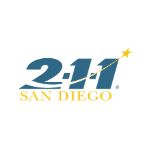
211 San Diego is the region’s trusted source for information and connections to community, health, and disaster resources. Our mission is to seamlessly connect people to resources and partner with our community to transform how people get the help they need.
In San Diego County, 1 in 3 adults and 2 in 5 children are nutrition insecure. Poor nutrition and subsequent obesity can put individuals at risk of serious, even fatal health disorders. Many uninsured or underinsured individuals may be paying too much or not receiving adequate health coverage, leading them to delay or forgo needed care and medications due to out-of-pocket costs. They are less likely to receive preventive services for chronic conditions such as diabetes, cancer, and cardiovascular disease. Chronic diseases account for 50% of all deaths in San Diego County. Most can be prevented through activities like eating well or getting regular health screenings.Low or unemployment can also influence a person’s wellness. Full-time employment is not easy to get or maintain. Even if employed, a person may not make enough money. Renters in San Diego County need to earn $36/hour (2.6 times the City of San Diego minimum wage) to afford the average monthly asking rent of $1,872. Other costs they would need to cover include food, transportation, utility bills, healthcare, and possibly childcare and diapers. The mental and physical stress of logistical challenges (e.g., childcare and transportation) can lead to chronic stress levels which may lead to more destructive physical and mental health consequences.
When people need help and don’t know where to turn, they can call 2-1-1, 24 hours a day, 365 days a year, in more than 200 languages. We help people access and unlock the value of free community resources so that they and our entire community can be more resilient.
We listen and connect them to the most appropriate resources for their situation. We help people address challenges they are facing in their own adulthood all the way to end of life, as well as challenges their children, parents and other family members are facing.
Because a person’s long-term outcomes depend on the services that we refer them to, we also play a role in helping community resources become more interconnected so that we can all offer high quality services. When we see a growing need in our community, we collaborate with regional partners to create new programs that offer new solutions. We also work with other organizations and government offices to improve processes, systems and policies.
1) Information & Referral
People who call 211 speak with a community connector trained to understand and attend to any trauma and circumstances they may be going through. Based on what someone shares, we identify and connect them to resources to help.
2) Safety Net Programs
By using this unique, phone-based service, people may engage, retain, and enroll in different public programs designed to reduce poverty. We electronically submit applications with telephonic signatures, helping people eliminate barriers they face to in-person enrollment, such as transportation, childcare or physical limitations.
3) Care Coordination
People presenting complicated barriers to accessing housing or healthcare may receive a specialized referral to this program where they set goals to overcome barriers and access services to attain financial stability; family wellness; manage or prevent chronic illness; and reduce utilization of hospitalizations or higher levels of care.
4) Community Information Exchange (CIE)
The CIE is an ecosystem comprised of multidisciplinary network partners that use a shared language, the 211 resource database, and an integrated technology platform to deliver enhanced community care planning. The CIE creates a single longitudinal record of an individual’s history and system interaction, enabling partners to accept and make referrals, coordinate with other providers, and send alerts and notifications to facilitate community care planning, transforming the social service delivery system into an efficient, resilient and digitally networked system of care.
5) Data Reporting/Analytics
We review 211 and CIE data in aggregate and in partnership with research institutions. We are working with individuals and community partners to develop a Data Equity Framework which we are applying locally and sharing nationally.
6) Disaster Preparedness and ResponseWe are the region’s 24-hour non-emergency information line. During or following a disaster, people call 2-1-1 for critical information, such as road closures, evacuation routes, food assistance programs, shelters, testing/vaccination centers, and more.
Become a supporter!
Donate or start a fundraiser
